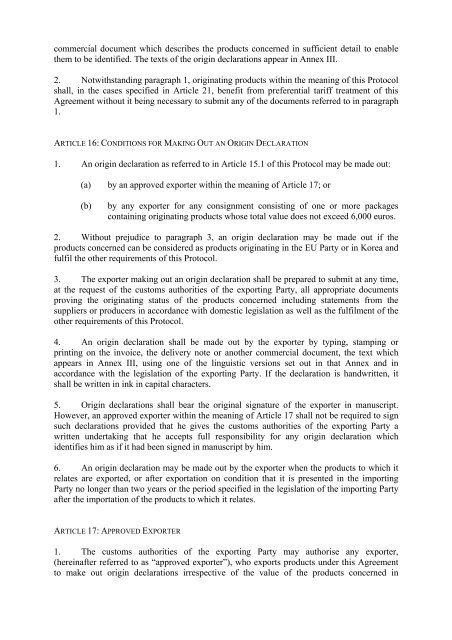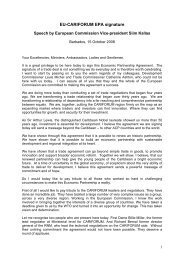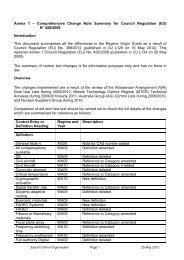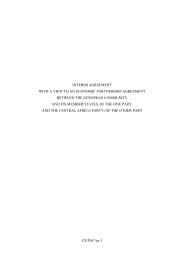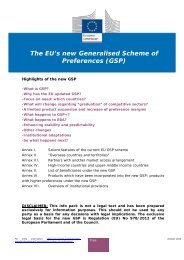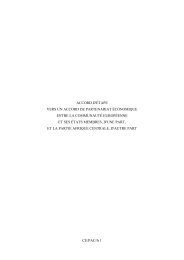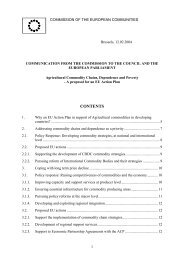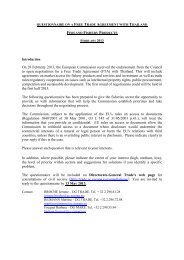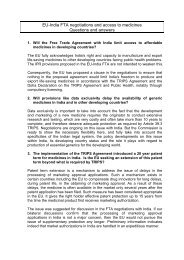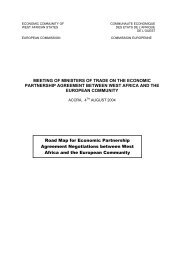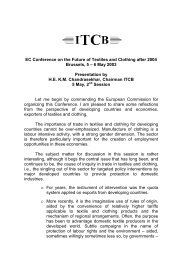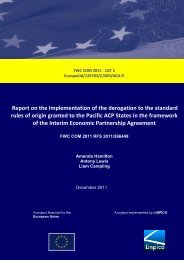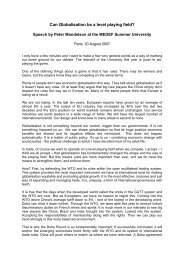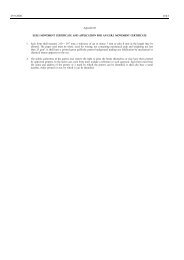Rules of origin
Rules of origin
Rules of origin
- No tags were found...
You also want an ePaper? Increase the reach of your titles
YUMPU automatically turns print PDFs into web optimized ePapers that Google loves.
commercial document which describes the products concerned in sufficient detail to enablethem to be identified. The texts <strong>of</strong> the <strong>origin</strong> declarations appear in Annex III.2. Notwithstanding paragraph 1, <strong>origin</strong>ating products within the meaning <strong>of</strong> this Protocolshall, in the cases specified in Article 21, benefit from preferential tariff treatment <strong>of</strong> thisAgreement without it being necessary to submit any <strong>of</strong> the documents referred to in paragraph1.ARTICLE 16: CONDITIONS FOR MAKING OUT AN ORIGIN DECLARATION1. An <strong>origin</strong> declaration as referred to in Article 15.1 <strong>of</strong> this Protocol may be made out:(a)(b)by an approved exporter within the meaning <strong>of</strong> Article 17; orby any exporter for any consignment consisting <strong>of</strong> one or more packagescontaining <strong>origin</strong>ating products whose total value does not exceed 6,000 euros.2. Without prejudice to paragraph 3, an <strong>origin</strong> declaration may be made out if theproducts concerned can be considered as products <strong>origin</strong>ating in the EU Party or in Korea andfulfil the other requirements <strong>of</strong> this Protocol.3. The exporter making out an <strong>origin</strong> declaration shall be prepared to submit at any time,at the request <strong>of</strong> the customs authorities <strong>of</strong> the exporting Party, all appropriate documentsproving the <strong>origin</strong>ating status <strong>of</strong> the products concerned including statements from thesuppliers or producers in accordance with domestic legislation as well as the fulfilment <strong>of</strong> theother requirements <strong>of</strong> this Protocol.4. An <strong>origin</strong> declaration shall be made out by the exporter by typing, stamping orprinting on the invoice, the delivery note or another commercial document, the text whichappears in Annex III, using one <strong>of</strong> the linguistic versions set out in that Annex and inaccordance with the legislation <strong>of</strong> the exporting Party. If the declaration is handwritten, itshall be written in ink in capital characters.5. Origin declarations shall bear the <strong>origin</strong>al signature <strong>of</strong> the exporter in manuscript.However, an approved exporter within the meaning <strong>of</strong> Article 17 shall not be required to signsuch declarations provided that he gives the customs authorities <strong>of</strong> the exporting Party awritten undertaking that he accepts full responsibility for any <strong>origin</strong> declaration whichidentifies him as if it had been signed in manuscript by him.6. An <strong>origin</strong> declaration may be made out by the exporter when the products to which itrelates are exported, or after exportation on condition that it is presented in the importingParty no longer than two years or the period specified in the legislation <strong>of</strong> the importing Partyafter the importation <strong>of</strong> the products to which it relates.ARTICLE 17: APPROVED EXPORTER1. The customs authorities <strong>of</strong> the exporting Party may authorise any exporter,(hereinafter referred to as “approved exporter”), who exports products under this Agreementto make out <strong>origin</strong> declarations irrespective <strong>of</strong> the value <strong>of</strong> the products concerned in


